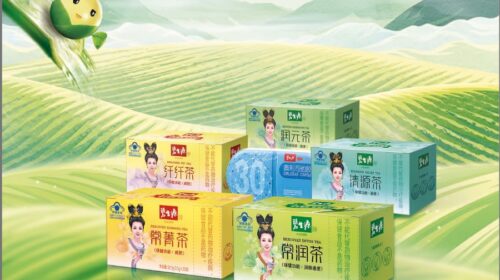Baiyunshan serves up high dividend in lieu of vanilla results

Profits from the company’s Great Health segment rose 14% in the first half of 2025, primarily driven by strong results for its popular Wanglaoji herbal tea
Key Takeaways:
- Baiyunshan’s revenue fell in the first half of this year due to weakness in its Great Southern traditional Chinese medicine segment
- The company is taking its popular Wanglaoji herbal tea drinks overseas as the brand faces intense competition at home
By Bai Xin Rui
Herbal tea isn’t just an important element of traditional Chinese culture, but has also become a recent lifesaver for Guangzhou Baiyunshan Pharmaceutical Holdings Co. Ltd. (0874.HK; 600332.SH). The company’s popular Wanglaoji brand of herbal tea drinks was the star of its latest earnings report for the first half of this year, even as a lackluster showing from its larger pharmaceutical business dragged down its profit by 1.3% year-on-year.
Formerly known as Guangzhou Pharmaceutical, Baiyunshan was established in 1997 and listed in Hong Kong the same year, followed by a listing in Shanghai in 2001. The current company was formed through a merger between Guangzhou Pharmaceutical and Baiyunshan in 2013, when it changed its name from Guangzhou Pharmaceutical to Baiyunshan.
A post-merger restructuring set up the company’s three core business segments: its Great Southern traditional Chinese medicine; its Great Commerce, focused on drug distribution; and its Great Health segment that includes Wanglaoji herbal tea drinks.
Great Health was the company’s primary profit driver in the first half of the year, generating 1.58 billion yuan ($220 million) in profits, up 13.9% year-on-year, and accounting for 51.1% of Baiyunshan’s total profit. The segment primarily consists of Wanglaoji Great Health, whose main products include Wanglaoji Herbal Tea, a household name in China’s beverage world, as well as its Lixiaoji lychee series, throat lozenges and its Guiling Gao herbal jelly.
The Wanglaoji brand, originally established in 1828 as an herbal tea shop, is the company’s biggest money spinner. Guangzhou Pharma acquired the trademark in 1992 and popularized Wanglaoji Herbal Tea, packaged in easily identifiable red cans, across China. The brand was once subject to a major legal dispute over the trademark, but Baiyunshan ultimately prevailed to secure its ownership. Today, Wanglaoji commands an estimated 70% of China’s massive herbal tea market.
On a revenue basis, the Great Health segment that includes Wanglaoji generated only 7.03 billion yuan in the first half of this year, or just 16.8% of Baiyunshan’s total of 41.83 billion yuan. By comparison, the largest contributor, Great Commerce, which mainly covers the distribution of drugs, medical devices and healthcare products, generated a far larger 29.1 billion yuan during the six-month period.
Big revenue, small margins
Despite its larger revenue contribution, Baiyunshan’s Great Commerce segment records very low gross margins, which clocked in at just 6.13% in the first half of the year, translating to a profit of just 346 million yuan, or only 11% of the company’s total. By comparison, the Wanglaoji-led Great Health segment boasted a far higher gross margin of 44.67%, up 1.69 percentage points year-on-year. As a result, while Great Commerce generated far more revenue, its profit contribution trailed Great Health’s.
While the Great Health segment recorded profit growth in the latest period, it also faces many rivals in China’s highly competitive tea beverage market. The new tea beverage segment’s rapid expansion has left the niche for herbal teas close to saturation. As more products have come to market, the ratio of consumers ages 18-35 choosing Wanglaoji as their tea drink of choice plummeted from 43% before 2022 to 27% in March 2025, according to a Nielsen survey.
Relief overseas
As China’s herbal tea leader, Wanglaoji has launched new flavors to compete with other emerging tea beverage brands and cater to changing consumer preferences by, for example, launching sugar-free and camellia-flavored herbal teas.
The company is also looking outside for relief from its overheated home market with the launch of its Walovi international brand last year. To date, Walovi has been focused on markets in Southeast Asia and North America, with rollouts in the U.S., Thailand and Malaysia, as well as Italy in Europe and Saudi Arabia in the Middle East. The company has also forged strategic collaborations with membership grocery chain Costco and e-commerce giant Amazon.
Meantime, Baiyunshan’s Great Southern traditional Chinese medicine segment continued to weigh on the company. The segment’s revenue fell 15.2% year-on-year to 5.24 billion yuan in the first half of 2025, accelerating from a 10.4% decline in 2024. Within the segment, revenue from traditional Chinese medicine plunged 20.1% to 3.25 billion yuan, while revenue from chemical drugs sagged by a milder 5.9% to 2 billion yuan.
Great Southern’s stable of brands includes several well-known Chinese names like Chenliji, Hejigong, Pangaoshou, and Baiyunshan. The segment’s key chemical drug, a generic version of Pfizer’s Viagra, branded as Jin Ge, has faced particular challenges from rival products, causing its inventory to surge 50%.
Baiyunshan also seems too content to sit on its laurels, which can be problematic in China’s fast-changing markets for its products. The company’s lack of new blockbuster drugs has been notable in recent years. Aiming to boost its pipeline, Baiyunshan has outlined plans to invest nearly 1.5 billion yuan to establish a second phase of its Guangzhou Pharmaceutical Fund. The fund will invest both directly and indirectly in other drug developers, with hopes that some of their promising products can reinvigorate Baiyunshan’s own portfolio.
Despite all those performance-related shortcomings, one place Baiyunshan excels is in its attractive dividend yield, which is expected to come in at 4.9% this year and 5.4% in 2026, above the 4.3% yield on the 10-year U.S. Treasury note. With potential U.S. rate cuts on the horizon, the dividends may become even more attractive, providing some support for the stock. But with little potential for positive surprises, the drag from the Great Southern traditional medicine segment, combined with intense competition for Wanglaoji in the new tea beverage market, could translate to limited upside for the stock over the near-term.
To subscribe to Bamboo Works free weekly newsletter, click here






